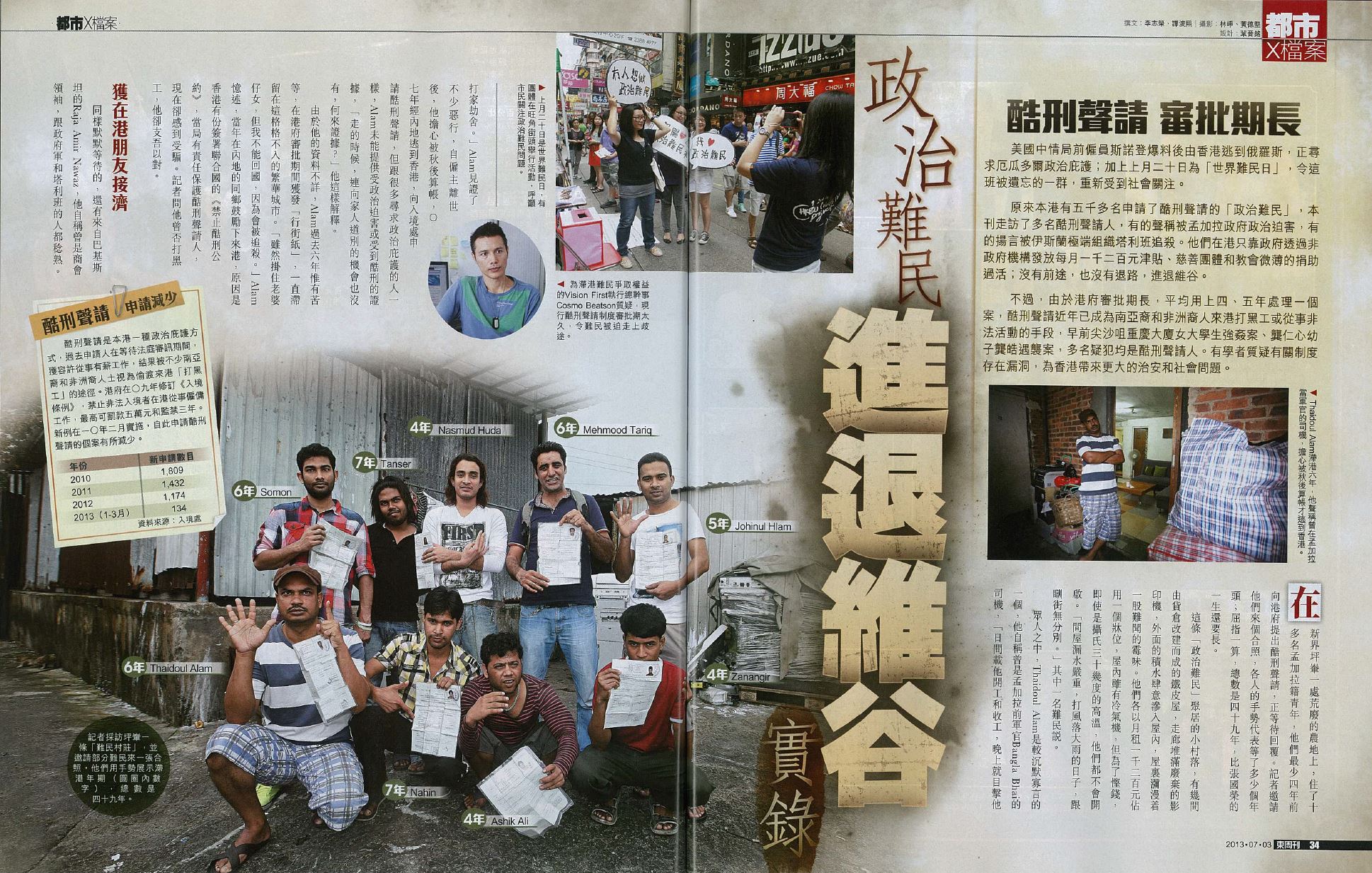Legal opinion on the Ping Che slums
Jul 5th, 2013 | Advocacy | Comment
The media interest on the Ping Che slums intensifies as concerned citizens query whether International Social Services (ISS) followed guidelines and abided by the law in authorizing the disbursement of government funds for these refugee slums. South China Morning Post have also uploaded the AFP video – now available here – that has been uploaded on over 30 websites worldwide. On Wednesday Vision First director Robert Tibbo visited the Ping Che slums and his comments are reported below in view of his considerable legal expertise:
Having seen the shacks in this compound, it is clear that the conditions are unacceptable. Human beings, in particular the asylum seekers, should not be living in these conditions. I question whether any of these residential premises are permissible in this area, whether this is zoned for residential living. It is clear that the asylum seekers have no choice about the extremely unhygienic conditions in which they live, including having toilets in their kitchens.
There are structures in Ping Che that clearly appear to be unsafe and dangerous. It is hard to believe that ISS and the Social Welfare Department have previously come down here and approved these living conditions. I have serious doubts that they ever came down here to approve these appalling living conditions. I would be interested to see the land title documents for these addresses and whether building permits for these residential living units even exist. I am curious as to who did the electrical work and whether the electrical work open wiring was installed by licensed electricians. Clearly this living environment for the asylum seekers comes as a great shock as Hong Kong is one of the world’s richest cities.
The Security Bureau and ISS have taken up responsibilities for the government in distributing aid, the Social Welfare Department oversee the living conditions for asylum seekers in the Ping Che area. These organizations, in my view, stand in a position of trust towards the asylum seekers, a position that I would describe as a fiduciary position. Looking at these terrible living conditions, I have my doubts about whether the government, Social Welfare Department and ISS have carried out their fiduciary duties towards asylum seekers.
This week TVB invited ISS director Ms. Panares to Ping Che for an interview, assuming she is proud of her housing program and willing to accompany journalists on an inspection. They were mistaken. Ms. Panares declined. She insisted on an interview in the comfort of her Mongkok office and offered the baffling excuse that, “Ping Che is overexposed!”
It is important to note that at 930am the day after TVB Pearl exposed the slums on the evening news (20 June 2013, World Refugee Day), Ms. Panares and a delegation of ISS officers pounded on that compound’s metal door unannounced. The sleeping refugees were shocked to open the door and see a dozen dignitaries had been dragged out of beds on a damage control mission.
For the first time ISS suggested refugees pair up to secure village rooms for which ISS would pay deposits and advance rent. It is also reported that ISS offered, “Whatever you need, refrigerators, stoves and gas cylinders … just make a request and we will give it to you.” The refugees were surprised by this sudden thoughtful attention after being ignored, cheated and discriminated against for years. As one witty Bangladeshi observed, “ISS treated us like VIPs … Very Inhuman Persons!”
There are reasons to doubt that humanitarianism is ISS’ core motivation at this stage. Vision First is of the opinion that ISS agreements in the slums and the landlords’ contracts and electricity demand notices, having contained incorrect information, might constitute evidence of offenses falling under the Theft Ordinance (sections 14-19).
In particular, we query whether these documents might evince:
- Theft by deception, with risk of prejudice to the government and tax-payers;
- Theft by false accounting, with information stated for false accounting purposes;
- Conspiracy to defraud, with parties involved in an elaborate scam for years.
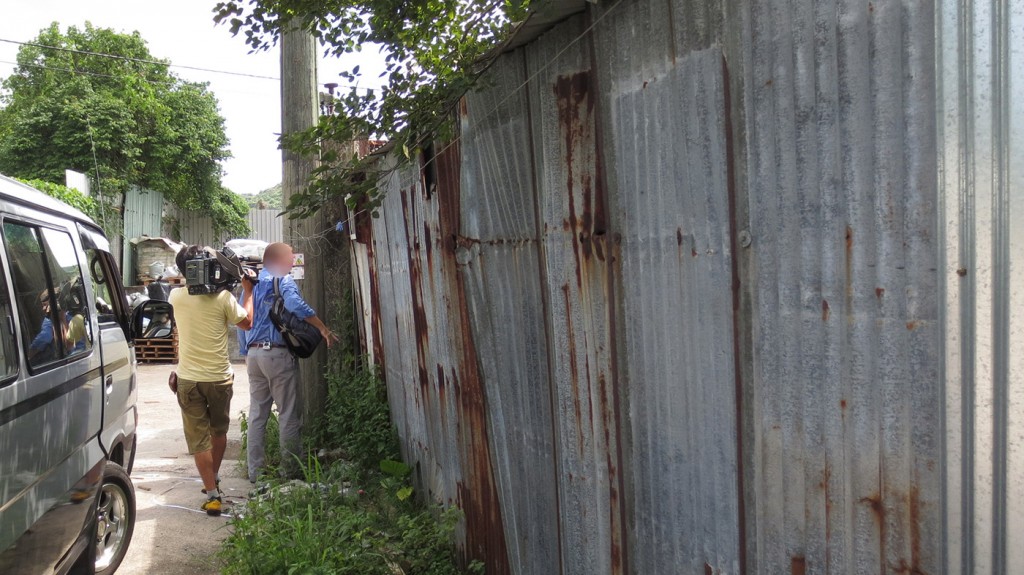
Eastweek Magazine on refugee slums
Jul 3rd, 2013 | Advocacy, Food, Housing, Immigration, Media, Personal Experiences, Refugee Community | Comment
ISS retreats from the slums at the sight of TVB camera
Jun 25th, 2013 | Advocacy | Comment

Vision First warmly welcomes any TV crew to film our outreach work – by suprise
Under Chinese gods
Jun 22nd, 2013 | Advocacy, Media | Comment
A Bangladeshi refugee rests under an altar for Chinese gods in front of his shack rented from a Chinese landlord inside a quarters at the rural Ping Chi in Hong Kong’s New Territories June 19, 2013. According to Vision First, a local non-governmental organization (NGO) supporting Hong Kong-based refugees, about 150 Bangladeshi asylum seekers and torture claimants reside in that area, suffering one of the worst conditions among thousands of refugees in the territory. Refugees in Hong Kong are not allowed to work, with the government paying HK$1,200 ($154) rent directly to the landlord. – REUTERS/Bobby Yip


Bangladeshi refugee Mdmozibur Rahman, 42, pictured beside his Indonesian wife Muslimah in their shack
TVB exposes ISS’ suspicious contracts
Jun 21st, 2013 | Advocacy, Media | Comment
Vision First voices the concerns of refugees who express their disappointment with ISS service and want to press Hong Kong Government to increase social support to a level where their basis financial and material needs are met. In this respect, we will press these demands on ISS and continue to expose the unsatisfactory service in all forums, until adequate assistance is provided to refugees who have neither savings, nor the right to earn a living.
1. Refugees are provided agreements in which both parties agree on the stated level of assistance. As many refugees indeed do not agree: Why does ISS issue “Agreements” and not “Notices? Why is rental assistance ordinarily capped at 1200$? Why aren’t home deposits paid when this is a basic requirement in the local market? How are refugees expected to move out of slums without money? What has ISS done to change rent and deposit restrictions with the government?
2. ISS contracts in the slums often show addresses different from where refugees live. ISS stated “The landlords in New Territories have document proof to show approval by the Lands Department for the structures in their properties.” Further ISS said refugees approach them for assistance when they already have a room and need help with rent: How and with whom does ISS check these documents? Isn’t ISS professionally bound to verify proof of ownership (with full address, not lot number) before authorizing the disbursement of government funds? Isn’t it ISS policy to ask clients to find a place themselves before ISS visits and confirms payment? Doesn’t ISS expect refugees to secure a room and pay the first month rent before paying the second month? How does ISS explain the discrepant contract address for clients ISS visited in the same compound?
3. ISS might argue that at times landlords falsify documents in order to receive payments for lodging refugees in other places. This would be a criminal offence. Doesn’t ISS have a professional duty to safeguard the wellbeing, and legal arrangements, of clients while their asylum claims are being processed? Why does ISS aid and abet the exploitation of refugees by slum landlords? ISS stated “Our staff are in contact with the landlords, during the negotiation for the rent and mode of payment and in handling clients and landlords’ concerns.” Is ISS complicit in these suspicious transactions for expedient and cost-saving reasons? ISS stated “ISSHK assists in … equipping the place with basic cooking and sleeping furniture and equipment.” Why do refugees complain they don’t have stoves and fridges?
4. ISS stated “clients are provided a forum to individually discuss their concerns with their caseworkers.” What tangible actions has ISS taken to deal with refugees’ complaints? If ISS is a true humanitarian agency, how does it justify its execution of an unfair, unsafe and inhumane policy that causes refugees extraordinary hardship without viable survival options? Isn’t it morally objectionable to promote a cruel government policy that perpetuates and exacerbates refugee suffering? Why doesn’t ISS rescind its contract with a government that punishes asylum seekers?
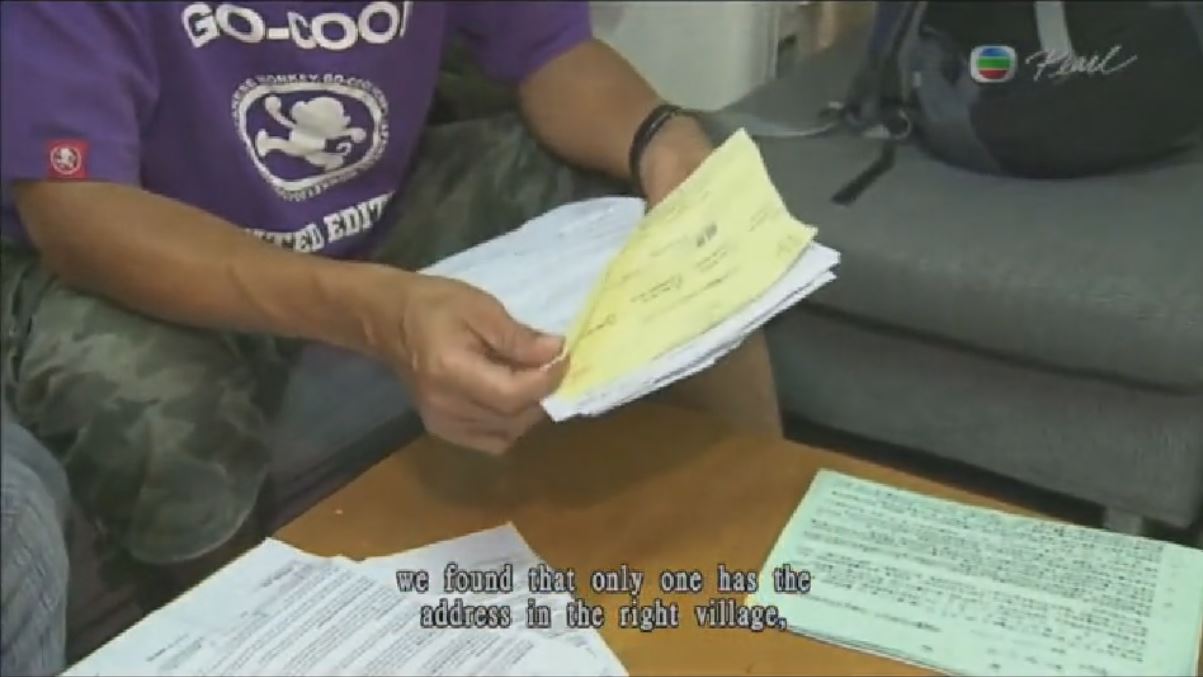
TVB reports on illegal structures and dodgy rental contracts in Ping Che slums
Refugees’ shabby compound appals activists
May 19th, 2013 | Advocacy, Media | Comment
John Carney writes for South China Morning Post on 19 May 2013
Bangladeshi asylum seekers, claiming torture in their homeland, scratch out shabby existence
Twelve Bangladeshi asylum seekers are enduring “unliveable conditions” in Ping Che that should shock the government into doing more for a community excluded from society, local human rights activists say. Their compound is pest- infested and lacks proper sewerage. Officials must take drastic action before the stark existence of these Bangladeshis worsened, said Vision First, an NGO that advocates rights for people seeking protection, and human-rights barrister Robert Tibbo. Vision First executive director Cosmo Beatson said: “These dangerous, dirty, unliveable conditions must be exposed as a matter of social justice, because Hong Kong has an obligation to treat fairly those who seek asylum here. They are invisible to society.” The men, who are between 23 and 40 years old, all claim to have been victims of torture. They each pay rent of up to HK$1,400 a month to live in roughly built shacks, accessed via narrow paths that pass stagnant streams, in the compound in the northeastern New Territories.
One miserable room housed a mother and her three-month-old baby. Plumbing is non-existent. Kitchens, showers and toilets flow into open conduits infested by insects and rodents. The residents wait for the rain to wash the conduits clean. “We are being treated like animals,” said Ali, 23. “We have [done] nothing wrong, so why should we be treated this way?” The compound is one of several housing more than 150 South Asian refugees in the Ping Che area. There are similar shanties in Nai Wai, Kam Tin and Pat Heung. Asylum seekers receive government help with rent – HK$1,200 per month paid directly to the landlord – groceries every 10 days and other basic necessities, such as toiletries and money for transport to government appointments. The help is given in kind – not in cash – by International Social Service, a non-governmental organisation commissioned by the Social Welfare Department.
However, Tibbo said that despite inflation and rising rents, the government aid had remained the same. “That fact that the amount given to asylum seekers has remained static has meant that their lives just get tougher,” he said. “It’s then they are forced to work illegally for a pittance to make ends meet.” Hong Kong does not allow asylum seekers to work. Some of the Bangladeshis in Ping Che did manual labour for HK$300 a day to help make ends meet, but a few days after the Sunday Morning Post visited their compound, two of the residents were arrested for working illegally and could now face a minimum of 15 months in jail if they plead guilty. Lawmaker Dr Fernando Cheung Chiu-hung said he backed Beatson’s and Tibbo’s mission and would raise the issue in the Legislative Council. International Social Service did not reply to questions about the situation.
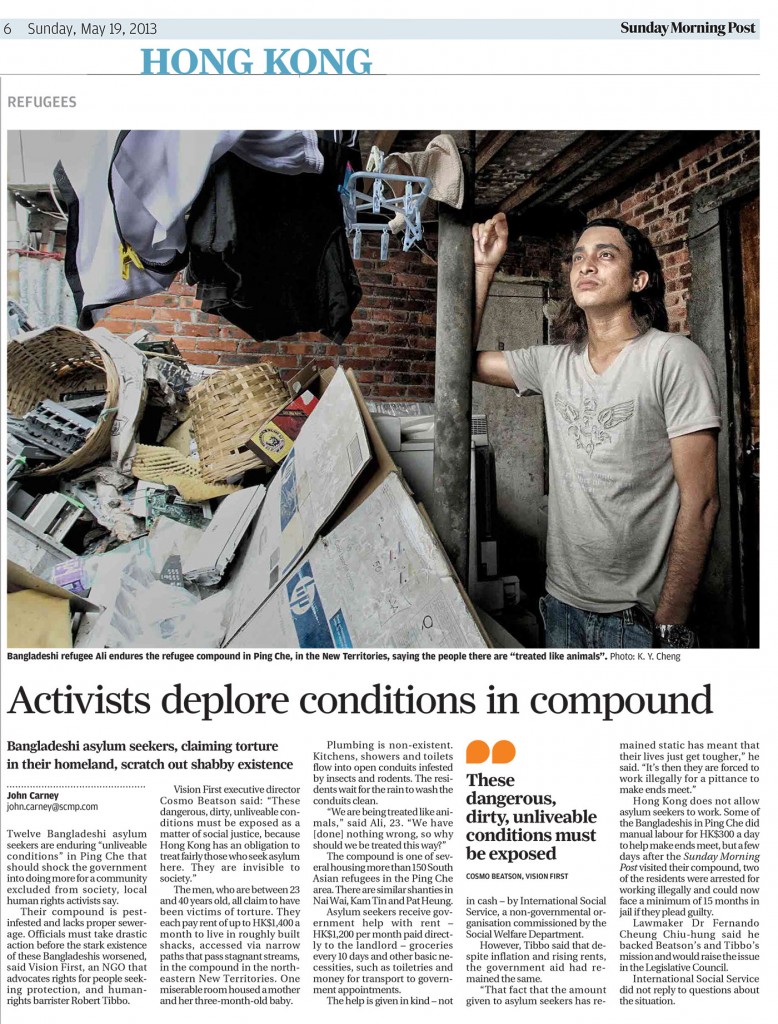
Bangladeshi refugees’ unliveable conditions appals activists
May 19th, 2013 | Advocacy, Housing, Media, Welfare | Comment
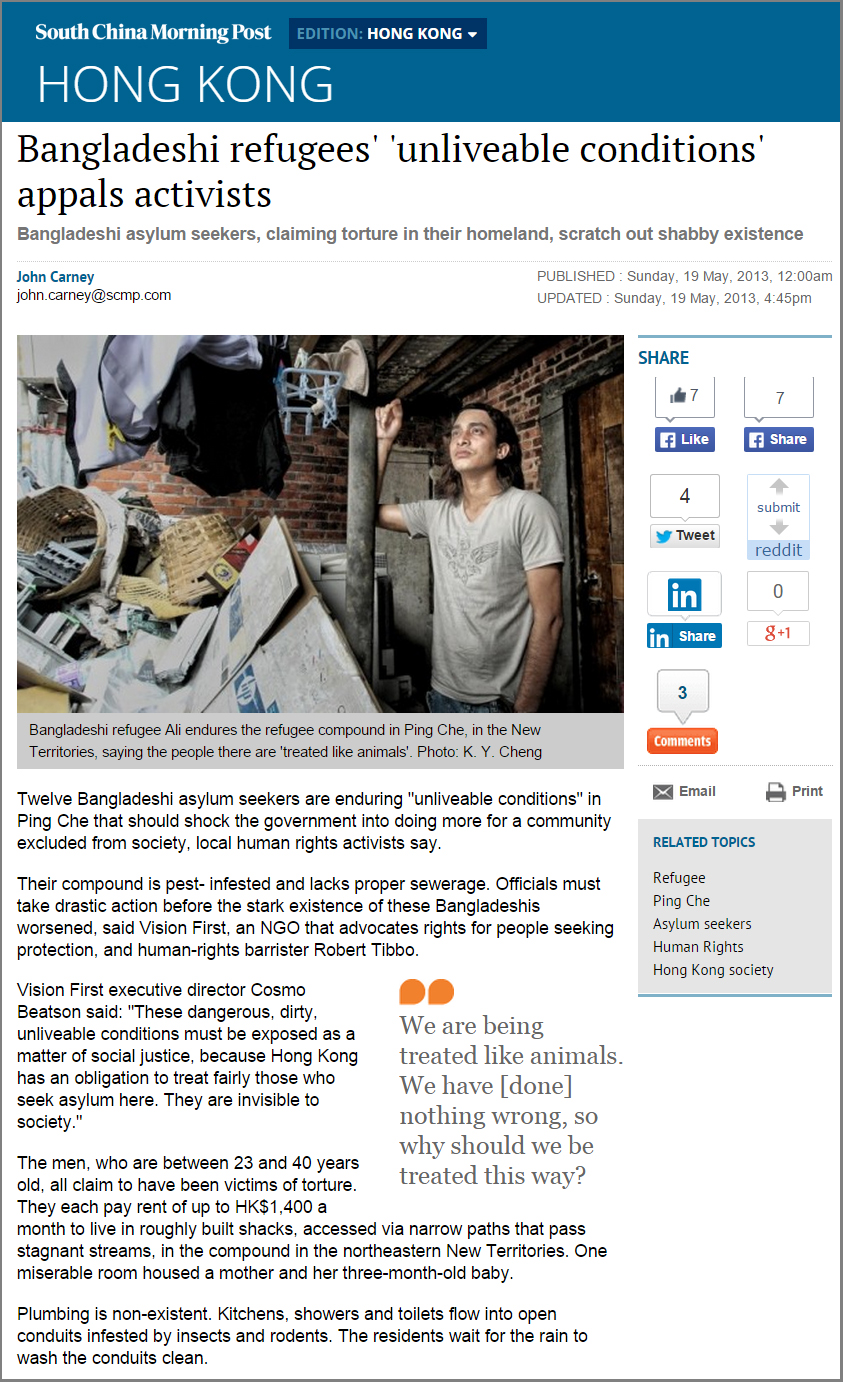
Resisting government labelling and engaging the community: The ‘March For Protection’ in Hong Kong
May 16th, 2013 | Advocacy, Media | Comment
Francesco Vecchio and Cosmo Beatson write for the Oxford Monitor of Forced Migration, an independent, student run publication that moves to engage with various aspects of forced migration through academic scholarship. The original article is available in the Oxford Monitor of Forced Migration, Volume 3, Number 1 and a simple PDF version is here.
This article intends to analyse an event that revealed new avenues for Hong Kong’s civil society to counter the government’s attempt to negate asylum seekers’ individual agency and the government’s opposition towards a comprehensive asylum policy. This article outlines the context which led to the organisation of the ‘March For Protection’ on 30 October 2012.In doing so, it aims to offer a starting point to explore and debate the march’s rationale, attainments and, more generally, civil society’s relationship with state power.
Asylum seekers in Hong Kong recently grabbed the headlines with a protest march in which they demanded fairer screening and rebuffed official and public views that generally depict them as bogus claimants. In the wake of the ‘March For Protection’ (MFP) and widespread English-language press coverage highlighting the difficulties asylum seekers face in the territory (for example Chiu, 2012a; SCMP Editorial, 2012; Kennedy, 2013; Yeung, 2013), civil society and UNHCR Hong Kong’s head-of-office called forcefully for local authorities to accede to the 1951 Refugee Convention (Chiu, 2012b; Read, 2013) and address current procedural shortcomings (Daly, 2012; Vision First, 2013a).
Hong Kong is a Special Administrative Region of the People’s Republic of China. Under the ‘one country, two systems’ policy, it enjoys relatively broad administrative independence in immigration policy. While it is not our intention to delve into China/Hong Kong relations, we note that although the mainland signed the 1951 Refugee Convention and provisions for refugees were included in domestic law, Hong Kong has instead firmly resisted its extension to the territory (Loper, 2010). Nonetheless, the city is a signatory to the 1984 Convention against Torture and other Cruel, Inhuman or Degrading Treatment or Punishment (CAT), and a two-track asylum screening system is available to refugees. On the one hand, UNHCR performs refugee screening. On the other, the Hong Kong Government assesses claims under article 3 of CAT, which prohibits the removal of a person to the country where s/he would face torture or other cruel treatment. In spite of its potential to minimise mistakes, this bifurcated asylum reality has been said to give rise to procedural confusion, delays and a wasteful duplication of resources. In fact, refugees’ concurrent or sequential reliance on both mechanisms, affects the understandings of asylum seeking. Additionally, public policy is shaped by Hong Kong’s memory of dramatic mainlander and Vietnamese refugee inflows in the past (Vecchio, forthcoming). The government has repeatedly asserted that were Hong Kong to accede to the 1951 Refugee Convention, the city would be flooded by waves of illegal migrants posing as asylum seekers to gain entrance and exploit local prosperity (see for example discussions in the Hong Kong Legislative Council, LG, 2011).
There are indications that this and other misconceptions are widespread in the community. A typical statement in this direction was made by scholar Victor Fung (2012), who recently alerted the readers of China Daily that waves of ‘economic migrants’ would inundate the city, working illegally to support their families back home. In his reply to UNHCR’s appeal, Fung warned that were Hong Kong to accede to the 1951 Refugee Convention, the territory would be doomed to ‘sink’ into the harbour and ‘drown’. However, the reasons why such a catastrophic scenario would inevitably unfold were not disclosed. As often happens (see Tao, 2009), the rationale supporting official propaganda on the formation of the Refugee Convention/illegal migration nexus is rarely elucidated, giving us the impression that certain beliefs have become so profoundly ingrained in Hong Kong’s mindset that they amount to tautological truths. While proponents offer no evidence to support the formulation of their views, any attempt to negate them is resisted no matter what evidence is presented to refute their validity.
Click “Read More” below for the full article

ISS shares the blame with refugees forced to work
May 15th, 2013 | Advocacy | Comment
Yesterday we visited the Compound under the Tree with a leading journalist and a human rights barrister in preparation for an upcoming high level inspection. We were surprise to encounter a delegation from International Social Services (ISS) who finally deemed an inspection appropriate. These fine social workers asked constructive questions, but we wonder if they asked themselves, “Would I live here? Are these structures legal? What housing regulations do they breach?” Later we took our VIPs to see another compound which we expect ISS will want to visit next week. Our Bangladeshi friends were clearly angry with ISS: they stomped the grounds expressing pent-up frustration and disappointment for being ignored for years. The tide is turning and ISS is now treating them with respect, knowing full well their salaries depend on how they treat clients who are effectively effects guest of Hong Kong government.
Later in the evening shocking news circulated: Dadu was arrested in the afternoon working in a nearby warehouse. A Bangladeshi father of two, Dadu sought asylum in 2007 with solid grounds for a torture/CIDTP claim. In fact, he would certainly win protection with the right lawyer. Occasionally he is forced to breach his conditions of stay to earn money he needs to live. Critics might argue that there is never a justification for breaking the law, but we can reasonably contend the opposite. Forced to live in a squalid shack – where snakes slither uninvited – Dadu is a victim of unreasonable, and therefore unlawful, policies that strangle his existence. It is our opinion that ISS is equally culpable for his troubles, as they are mandated to execute the government’s asylum strategy. Let’s examine the financial reality Dadu shares with some 200 refugees living in Ping Che rural area:
- to keep a shantytown roof over their head they are charged 1400$, but ISS only pays 1000-1200$. These are the cheapest rooms anywhere, but without income, how does ISS expect them to pay the balance? Would ISS staff please show refugees where and how to collect the difference?
- to keep utilities running landlords extort 800$ a month, but ISS pays them nothing. Note that all refugees in Kowloon receive 130$ for electricity and 60$ for water every month. Why does ISS discriminate against rural refugees living in shacks? What does ISS do to counter these extortionary, undocumented utility bills?
- to collect government food in Yuen Long they spend 28$, but ISS refunds 10$ expecting them to walk through fields for thirty minutes to catch a cheaper bus in another village, rain or shine. Why does ISS impose unnecessary hardship by demanding unreasonable routes? Would ISS staff like to hike to a distant bus terminal with these refugees?
- to attend Immigration at Mataukok they spend 45$, but ISS refunds only 35$ (one guy only gets 33$). No explanation is given. No alternative route suggested. Months of pleads fall on deaf ears. Why does ISS deliberately throw roadblocks in their way? Would ISS staff like to cut 10$ from their commute to work?
- to cook their food they need a gas cylinder ever two months, but ISS allows the purchase every four months (one guy gets it every five months). Note that all refugees in Kowloon are paid every two months. How does ISS expect them to cook and eat? Would ISS staff like to demonstrate how to cook for five months with one cylinder?
- all ISS clients lament that refunds are made the subsequent month, if not later, so refugees must pre-pay essential needs while barred from working. While receipts are understandably required, why doesn’t ISS prepay once so that clients have cash on hand?
These examples demonstrate that Ping Che refugees are discriminated against by ISS. They should receive adequate social provisions that prevent destitution. They are not economic migrants who work to send money home. They are refugees seeking international protection who are forced to raise the money needed to survive. Dadu barely eked out an existence. He took the risk of 15 months jail (22 months for pleading non-guilty and 15 for guilty) to keep a roof over his head because he simply HAD NO ALTERNATIVE. The government will enter his details in statistics misconstrued to prove refugees are economic migrant, but truly what choice did he have? Dadu is older than average, smart and thoughtful. He is not a reckless individual. By going to work yesterday, he lost his freedom for 15 months in an attempt to pay his bills. Nobody who understands his living conditions could ever say that his motivation was profit, or greed.
If ISS provided adequate support – instead of depriving Ping Che refugees – it is likely that Dadu would be sleeping in the government sanctioned shantytown – not in jail. The asylum support system is rigged against refugees who are forced to work by the financial pressure imposed on them. One could argue that current social provisions are intentionally designed to force illegality, to criminalize and trigger deportation orders before genuine claims are determined. In other democracies one is fined for working in breach of conditions of stay, not jailed for over one year for a day’s labour. It is our opinion that ISS is complicit. Their policies impose a hardship that can only be countered by earning wages. ISS is therefore accessory to Dadu’s crime, having generated the conditions that contributed to his decision. They might not have been present at the commission of the offence, but are guilty as participants, as their negligent, harmful policies push refugees over the edge. Refugees united, look forward to the day when ISS is summoned to a Legco panel and to the high court to explain the rationale behind their inhuman policies.

We expect ISS to scramble their staff to inspect this compound next week
The compound under a tree
May 9th, 2013 | Advocacy | Comment
In the rural area around Ping Che (Fanling) live about 150 Bangladeshi asylum seekers and torture claimants who have nobody to turn to for help. There are also refugees of other nationalities residing in that area, but this community is suffering the worst conditions. Besides the issue that not a single Bangladeshi has been accepted as torture victim in 21 years, their appalling living conditions are a matter of social justice and human rights. The squalid reality of their shanty homes must be exposed for several reasons:
- Wasted years: some haven’t been contacted by Immigration in 6-7 years. Multiply 12,409 torture claimants (since 1992) by an average 4 year delay = 49,636 years. Divided this by an average lifetime of 75 years = 661 lives wasted waiting for ultimate rejection. The Immigration Department’s strategy is to force claimants to give up and leave in desperation. Justice delayed is justice denied.
- Exploitation: this landlord houses 12 distressed refugees to collect rent of 1200$ a month per person. There are no proper roofs or walls, yet he has installed electricity meters to make sure he earns a profit on their utility bills. Who authorized or allowed this to happen? The Agricultural Department wouldn’t permit a pig farm in these conditions!
- Dangerous conditions: lightning could strike the tree … rain and flooding could spark electrocution … gas cylinders could explode … the shanty homes could collapse in a storm, let alone in a typhoon. These shacks are not fit for human habitation and are infested by cats, insects, rodents and snakes. Yet a mother lives there with a baby! Who approved these homes?
- Unsanitary quarters: there is no plumbing or sewerage. Kitchens, showers and toilets flow into open conduits infested by insects, rodents and … disease. Residents wait for the rain to wash the ducts and outlets clean. Luggage is stored in the rafters, away from the damp floor. Who inspected these premises? Who has a duty to check refugee homes?
- Illegal structures: this yard is not zoned for residential use and the rooms do not meant any safety standard. The dwellings would never pass Land Department certification or Fire Department approval for any kind of use. Why are unscrupulous landlords lining their pockets with government rent assistance? Who authorized renting these rooms to refugees? Does ISS have actual or constructive knowledge of this?
- Public funds: Is this misappropriation of government funds? It appears that SWD (and their agent ISS) is unaware of these deplorable conditions. Is anyone complicit with those who profit from this arrangement? In 2012 ISS received 143 million HK$ to support refugees. ISS rejects substandard rooms in Chung King Mansions and Kowloon, but appear to turn a blind eye in the New Territories. Has ISS visited these homes? Are these inhuman conditions approved by ISS? Could this be a deliberate strategy to marginalize and frustrate refugees?
- Criminalization: fearful of draconian sentences for illegal work (15 month jails for pleading guilty and 22 months for not guilty), the financial tourniquet cripples refugees’ survival strategies. However, we note that seeking physical security from persecution as well as economic opportunities in a country of asylum can hardly be regarded as incompatible objectives for poverty stricken refugees. What options do refugees have? How are they expected to survive?
This compound under a tree is one of several similar structures that house refugees in the Ping Che rural area. There are other shanty complexes scattered across the New Territory, particularly near Nai Wai, Kam Tin and in the Pat Heung hills. These dirty and dangerous shacks are unfit for living. Their use as permanent PAID homes for refugees must be exposed as a matter of social justice. What honour is there in offering protection with one hand, while strangling refugees with the other?
Vision First strongly objects to ISS’ decision to limit rent to 1200 HK$, without paying deposits for poverty stricken refugees who are not allowed to work. Critics will argue that residents on CSSA receive similar amounts. However, CSSA recipients enjoy supplement payments and may work any time for a minimum wage of 32 HK$/hour, without fearing imprisonment for a maximum of 36 months and a 50,000 HK$ fine. Refugees – cursed by the Hong Kong reality – are damned if they work and damned if they don’t! Vision First believes this situation is an affront to Hong Kong citizens who have put their fate in the government to do what is right and dignified in refugee policies. Let us not forsake our humanity.



